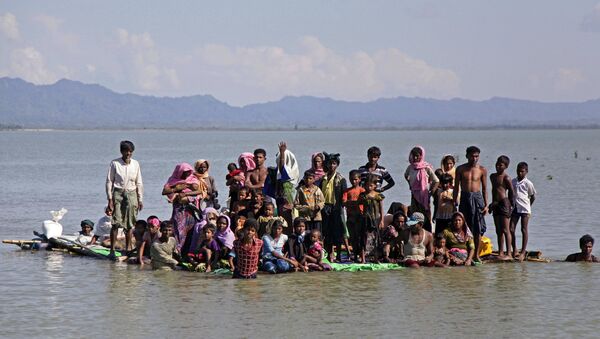Aung San Suu Kyi, the State Counsellor of Myanmar and the de-facto leader of the state might face responsibility for one of the largest humanitarian crisis of the recent times. This is what the UN's High Commissioner for Human Rights — Zeid Ra'ad al-Hussein — told the BBC.
According to the High Commissioner, Aung San Suu Kyi failed to act in response to the crisis that led to death and expulsion of Rohingya Muslims in Rakhine State.
He also said that the crackdown on the Rohingya might qualify as genocide in the future.
Radio Sputnik discussed the issue with Nehginpao Kipgen, Assistant Professor and Executive Director of the Center for Southeast Asian Studies at Jindal Global University, a US-based political scientist and author of three books on Myanmar.
According to Dr. Kipgen the international community has failed to understand that the real political structure in Myanmar right now is a military regime, with the military leaders not being accountable to the civilian government led by Aung San Suu Kyi.
"There must be a ceasefire, the government must restore order, there must be a mutually agreeable solution," he said, pointing out that he does not intend to defend either the Myanmar government or the military.
"Things must be done on ground level first. If the Kofi Annan Commission report is entirely implemented, the problem will eventually be resolved," he argued, referring to the Advisory Commission on Rakhine State, led by former UN Secretary-General Kofi Annan.
Dr. Kipgen believes the orders that led to what is now known as "purge" of the Rohingya came from the military leadership. He explained that the problem actually has its roots in the country's independence, obtained in 1948. After the declaration of independence there already were some muslim insurgents who fought for the Rohingya-majority territories to secede and to be annexed by East Pakistan, which we now know as Bangladesh.
The insurgent movement lost its momentum during the second half of 20th century, with the last major outbreak of violence dating to 2001, but then came 2016, when a new insurgent group, Harakah al-Yaqin ignited tensions which has led to a violent crackdown on Rohingya.
Speaking about Aung San Suu Kyi, Dr. Kipgen noted that she has spoken out on the issue, but the problem is that she "did not say what the international community would like her to say." Aung San Suu Kyi initially claimed she would like to maintain neutrality between the warring factions. Should she speak up against the violence, she might either lose the elections or face a military coup that would lead to her being put under house arrest.
And she is very well aware of those possibilities, Dr. Kipgen notes.




